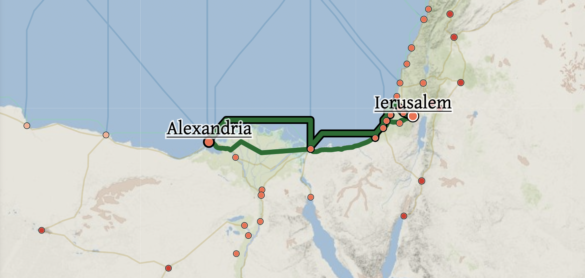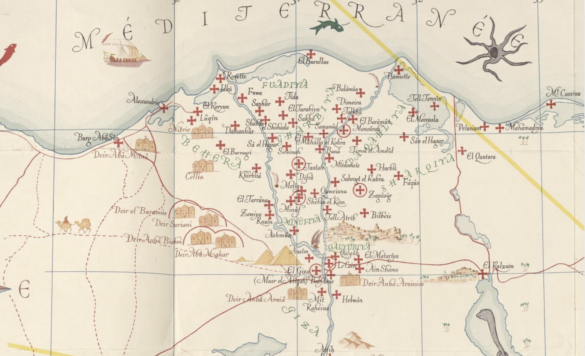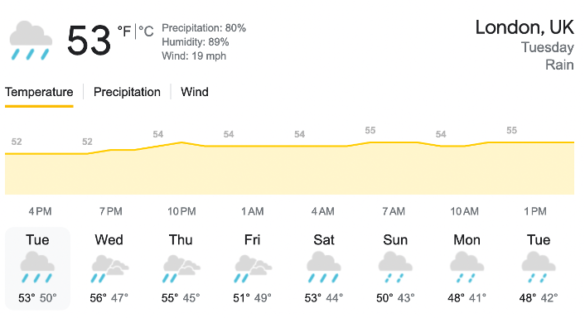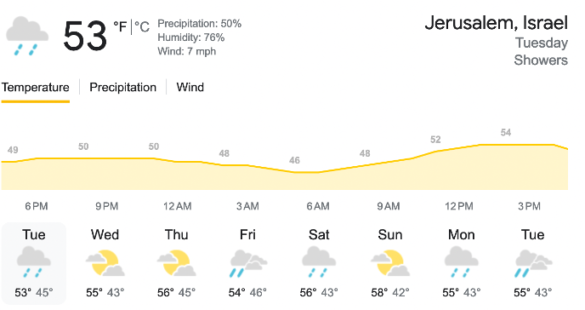Sermon — January 15, 2023
The Rev. Greg Johnston
“Here is the Lamb of God who takes away the sin of the world.” (John 1:29)
If I were a betting man, which I’m not, I’d be willing to wager about three dollars that 95% of you, when you hear this verse from the Gospel of John, have one of the three following gut responses:
- “What on earth is he talking about?” In other words: John the Baptist declares Jesus twice to be “the Lamb of God,” with no further explanation at all. And to many of us, who live an ocean and a half away and speak a completely different language and are unfamiliar with the religious practices of first-century Judaism, which were quite different from the practices of twenty-first century Judaism, it just makes no sense. “Here is the Lamb of God who takes away the sin of the world?” What on earth is he talking about?
- “I’m not sure I like that very much.” As in: I have these half-remembered verses bouncing around in my head about lambs and slaughter and blood and sacrifice and sin, and I feel vaguely or even very uncomfortable about them. Maybe you’re familiar with the use of this image in the Book of Revelation; maybe you’re as big a fan of The West Wing as I am, and you recognize the name of a fictional cult, “The Lambs of God,” who gruesomely harass President Bartlett’s daughter. Whatever it is, I suspect some of you might have this instinctive queasiness about the image of “the Lamb of God” and so your first response is: I don’t like that.
- Or maybe you have the third and maybe most common response to this verse: (singing) “‘Lamb of God, you take away the sin of the world.’ I’ve sung that.”
You may have a different response and I apologize if I’ve left you out, but I think these three capture the paradox of John’s words in the gospel today. The mysterious title “lamb of God” appears only twice in the entire Bible, and they’re both right here in this morning’s reading from John. John the Baptist doesn’t explain it. Nobody else seems to use it. Matthew, Mark, Luke, and Paul know nothing about it. And yet there it is, right in the heart of our liturgy, so central a part of the mass that even secular students of classical music know its Latin name, Agnus Dei, “Lamb of God,” because there have been—what—probably thousands of musical settings composed to sing these words over the last two thousand years.
So this morning, I’m going to preach on Isaiah. (Just kidding.) No, I want to talk a little bit about that question: What does it mean to say that Jesus is the “Lamb of God”?
First, I think we have to start with the fact that for John’s audience—and this is true both for “John the Baptist” speaking to his disciples and for the later and different “John the Evangelist,” writing this gospel for his community—for either John’s audience, the primary symbolic connection would have been with Passover, with the ritual slaughter of lambs as part of the preparation for the Passover meal. The Passover sacrifice commemorated the people’s flight from Egypt in the Book of Exodus, when the blood of a lamb painted on their door-posts turned away the angel of Death from their doors, and it was one of the major feasts for which most of the population traveled to the Temple in Jerusalem.
John the Evangelist, writing the gospel, clearly sees this as one of the primary roles of Jesus: he is not just a teacher, not just a healer, not just a leader or a religious reformer; he is the Lamb, with a capital L, the ultimate Passover sacrifice who will, by his own death, drive away death, not just on one night but for all eternity. And this symbolic connection is so important to John that John, alone of all the gospels, places Jesus’ death on Good Friday not on the day of the Passover, but on the day before, the day of preparation for the Passover, so that at the very moment when the Passover lambs are being slaughtered in the Temple, Jesus is dying on the cross. Jesus is “the Lamb of God,” the ultimate Passover sacrifice.
But the words of John the Baptist evoke a second kind of sacrificial lamb, because Jesus is not just “the Lamb of God,” he is “the Lamb of God, who takes away the sin of the world.” This is not what the Passover lamb does. In the story of the Exodus, the Passover lamb drives away death. The Passover feast is a time to celebrate this deliverance. But the Passover sacrifice is not what the Bible calls a “sin-offering.” The practice of animal sacrifice is very foreign to our experience of worship, but it was the main part of religious ritual in the ancient Mediterranean world. The Bible lays out a whole system of sacrifices that could be offered in the case of various sins, and sacrificing a lamb was a perfectly reasonable way to make amends with God. Especially if you had inadvertently sinned, the sprinkling of the animal’s blood around the altar of the Temple would purify the Land itself, ensuring that God wouldn’t be driven out by the accumulated impurity of all the people’s sins. And, again, if this doesn’t sound very familiar to you, it’s because animal sacrifice hasn’t been practiced in either Christianity or Judaism in nearly two thousand years, since the destruction of the Temple few decades after Jesus’ death made it impossible; but it would have made perfect sense at the time.
And so what John is saying is interesting: Jesus is the Lamb of God who takes away the sin of the world. He is not just yet another lamb, clearing away the effects of yet another sin. He is the Lamb, singular, taking away the sin—singular—of the world. As the Book of Hebrews would point out, he is not a priest who offers sacrificial victims again and again, year after year. In Christ, we no longer offer continual sacrifices to make amends with God. In Jesus, God sacrifices God’s own self, once and for all, to take away the sin of the world.
But finally, there’s a third meaning to the idea that Jesus is the “Lamb of God,” and that’s the idea of feasting in celebration and thanksgiving, and this is what connects the Passover sacrifice to what we do today. If you had come and offered a lamb as a sin-offering, by the way, parts would be offered to God, being burned on the altar, and parts would be given to the priests to cook and eat; but none of it came back to you. But if you came to celebrate the Passover, the lamb would be slaughtered by the priests in the prescribed way, but then you would take it home to cook it and eat it, just as the Bible prescribed, with your family and whole household, and you celebrate and rejoice for your deliverance from slavery in Egypt, and ultimately, from the power of Death itself. And it’s this literal feast of thanksgiving that our liturgy evokes in those other common words at the breaking of the bread: “Alleluia! Christ our Passover is sacrificed for us. Therefore let us keep the feast. Alleluia!”
Jesus is the Lamb of God, who not only offers himself as a sacrifice to drive away the power of death, who not only offers himself as a sacrifice of sin, but who gives us his own flesh and blood to feed us and nourish us. And this is kind of gross. And Jesus knows. And it’s no accident that it’s this very Gospel of John, where Jesus is the Passover Lamb of God, that reckons most practically with the vaguely-grotesque notion that the Eucharist is the Body and Blood of Christ, because a few chapters later, when Jesus teaches his disciples that “those who eat my flesh and drink my blood abide in me, and I in them,” they are scandalized, and many of them leave him behind, and never look back. (John 6:56, 66) And fair enough.
So what does all this mean for you and me, who do not offer animal sacrifices and do not celebrate Passover, at least not in that same way?
What it means is that in Jesus, God chooses to do the sacrificial work of reconciliation for us, and invites us to celebrate and give thanks in response. The burden is no longer on us—or on our lambs—to make things right with God, to offer sacrifices to drive away the power of death or to make amends for sin. The burden is not on us, in other words, to earn God’s forgiveness by giving money to the church or by doing good works or by saying the right prayers. God has freed us, at least in theory, from the shame of sin and from the fear of death, and to the extent that this freedom isn’t free, God has paid the price. And God is strengthening us in this life, while we still face this very real shame and fear, with the gift of God’s presence in the Holy Spirit and in the Holy Communion and in the holy Body of Christ in the church, sitting all around you.
And God has invited us to respond—to be fed and nourished by the riches of God’s grace, in this eucharistic feast and in our spiritual lives—to be strengthened by God’s presence in our lives, and to live lives of gratitude and celebration, so that we may truly “keep the Feast.”
So Alleluia! Christ our Passover has been sacrificed for us. Therefore let us keep the feast, Alleluia!






